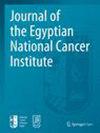A comparative study in left-sided breast cancer treated with moderate deep inspiratory breath hold versus free breathing
IF 2.1
Q3 ONCOLOGY
Journal of the Egyptian National Cancer Institute
Pub Date : 2024-04-08
DOI:10.1186/s43046-024-00214-6
引用次数: 0
Abstract
The moderate deep inspiratory breath hold (mDIBH) is a modality famed for cardiac sparing. Prospective studies based on this are few from the eastern part of the world and India. We intend to compare the dosimetry between mDIBH and free-breathing (FB) plans. Thirty-two locally advanced left breast cancer patients were taken up for the study. All patients received a dose of 50 Gy in 25 fractions to the chest wall/intact breast, followed by a 10-Gy boost to the lumpectomy cavity in the case of breast conservation surgery. All the patients were treated in mDIBH using active breath coordinator (ABC). The data from the two dose volume histograms were compared regarding plan quality and the doses received by the organs at risk. Paired t-test was used for data analysis. The dose received by the heart in terms of V5, V10, and V30 (4.55% vs 8.39%) and mean dose (4.73 Gy vs 6.74 Gy) were statistically significant in the ABC group than that in the FB group (all p-values < 0.001). Also, the dose received by the LADA in terms of V30 (19.32% vs 24.87%) and mean dose (32.99 Gy vs 46.65 Gy) were significantly less in the ABC group. The mean treatment time for the ABC group was 20 min, while that for the free-breathing group was 10 min. Incorporating ABC-mDIBH for left-sided breast cancer radiotherapy significantly reduces the doses received by the heart, LADA, and left and right lung, with no compromise in plan quality but with an increase in treatment time.左侧乳腺癌患者接受中度深吸气屏气与自由呼吸治疗的比较研究
中度深吸气屏气(mDIBH)是一种著名的心脏疏通方式。在世界东部和印度,基于这种方式的前瞻性研究很少。我们打算比较 mDIBH 和自由呼吸(FB)计划之间的剂量测定。研究对象为 32 名局部晚期左侧乳腺癌患者。所有患者的胸壁/完好乳房都接受了 50 Gy 剂量(25 次分次)的治疗,如果进行了保乳手术,则在肿块切除腔内进行 10 Gy 的增量治疗。所有患者均采用主动呼吸协调器(ABC)进行 mDIBH 治疗。对两种剂量体积直方图的数据进行了比较,以了解计划质量和危险器官所接受的剂量。数据分析采用配对 t 检验。在心脏接受的剂量(V5、V10 和 V30)(4.55% vs 8.39%)和平均剂量(4.73 Gy vs 6.74 Gy)方面,ABC 组比 FB 组有显著的统计学差异(所有 p 值均小于 0.001)。此外,就 V30(19.32% vs 24.87%)和平均剂量(32.99 Gy vs 46.65 Gy)而言,ABC 组的 LADA 接受的剂量也明显低于 FB 组(P 值均小于 0.001)。ABC 组的平均治疗时间为 20 分钟,而自由呼吸组为 10 分钟。在左侧乳腺癌放疗中采用 ABC-mDIBH 技术可大大减少心脏、左侧乳腺组织、左肺和右肺所接受的剂量,同时不会影响计划质量,但会增加治疗时间。
本文章由计算机程序翻译,如有差异,请以英文原文为准。
求助全文
约1分钟内获得全文
求助全文
来源期刊
CiteScore
3.50
自引率
0.00%
发文量
46
审稿时长
11 weeks
期刊介绍:
As the official publication of the National Cancer Institute, Cairo University, the Journal of the Egyptian National Cancer Institute (JENCI) is an open access peer-reviewed journal that publishes on the latest innovations in oncology and thereby, providing academics and clinicians a leading research platform. JENCI welcomes submissions pertaining to all fields of basic, applied and clinical cancer research. Main topics of interest include: local and systemic anticancer therapy (with specific interest on applied cancer research from developing countries); experimental oncology; early cancer detection; randomized trials (including negatives ones); and key emerging fields of personalized medicine, such as molecular pathology, bioinformatics, and biotechnologies.

 求助内容:
求助内容: 应助结果提醒方式:
应助结果提醒方式:


